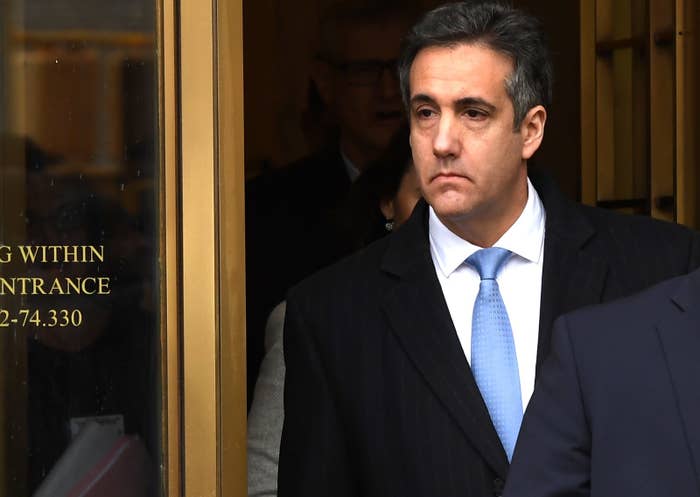
WASHINGTON — President Donald Trump's former personal lawyer, Michael Cohen, will not be testifying before Congress on Feb. 7 as planned, Cohen's lawyer announced Wednesday.
Noting that Cohen had agreed to testify voluntarily, his lawyer, Lanny Davis, said in a statement that recent comments by Trump and Trump attorney Rudy Giuliani had forced Cohen to put off the appearance.
"Due to ongoing threats against his family from President Trump and Mr. Giuliani, as recently as this weekend, as well as Mr. Cohen's continued cooperation with ongoing investigations, by advice of counsel, Mr. Cohen’s appearance will be postponed to a later date," the statement said.
Cohen, who served as Trump's personal lawyer for many years, has pleaded guilty to campaign finance charges and charges of lying to Congress related to his work for Trump, as well as fraud charges. He was sentenced to three years in prison as a result of the pleas, but his congressional testimony was to come before starting his sentence.
"This is a time where Mr. Cohen had to put his family and their safety first," Davis said.
Davis said in the statement that Cohen "looks forward to testifying at the appropriate time" before the House Oversight Committee — although one senior Democrat on the committee has suggested that a subpoena for Cohen's testimony is expected to follow Wednesday's announcement.
The committee's chair, Rep. Elijah Cummings, didn't go quite that far in a joint statement issued with House Intelligence Committee chair Adam Schiff, saying that "not appearing before Congress was never an option" — but not saying that a subpoena would be forthcoming.
"We will not let the President’s tactics prevent Congress from fulfilling our constitutionally mandated oversight responsibilities," the pair said in the statement. "This will not stop us from getting to the truth. We expect Mr. Cohen to appear before both Committees, and we remain engaged with his counsel about his upcoming appearances.”
Cohen's testimony was highly anticipated — but also could have ended up being a bit of a letdown due to reports that he would not be testifying about matters still under investigation by the special counsel's office.
This past week, Trump suggested that Cohen's father-in-law should be "watch[ed]" in connection with what Trump tweeted were Cohen's actions of "[l]ying to reduce his jail time!"
Kevin Corke, @FoxNews “Don’t forget, Michael Cohen has already been convicted of perjury and fraud, and as recently as this week, the Wall Street Journal has suggested that he may have stolen tens of thousands of dollars....” Lying to reduce his jail time! Watch father-in-law!
Trump earlier referenced Cohen's wife in a tweet claiming that she and Cohen's father-in-law got off "Scott Free" and told Fox News' Jeanine Pirro on Jan. 12 that, instead of talking to prosecutors about Trump, Cohen "should give information, maybe, on his father-in-law, because that’s the one that people want to look at."
Over this past weekend, Giuliani, Trump's current personal lawyer, was asked by CNN's Jake Tapper whether it was "appropriate" for Trump to "go after" Cohen's father-in-law.
"Of course it is. If the father-in-law is a criminal," Giuliani responded. "And the Southern District of New York [prosecutors], in the [Cohen] plea, wanted him to go to jail and said he’s lying. ... They say he’s lying because he’s holding back information that is far more damaging than the lies that he’s sharing with them now."
Giuliani went on to say that Cohen's father-in-law is Ukrainian and claimed, "The reason that’s important is, he might have ties to something called organized crime."
Cummings and Schiff, however, warned Trump against obstructing Congress in its oversight efforts.
"Our nation's laws prohibit efforts to discourage, intimidate, or otherwise pressure a witness not to provide testimony to Congress," the pair said. "The President should make no statement or take any action to obstruct Congress' independent oversight and investigative efforts, including by seeking to discourage any witness from testifying in response to a duly authorized request from Congress."
Matt Berman and Lissandra Villa contributed reporting.

